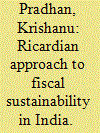| Srl | Item |
| 1 |
ID:
160033


|
|
|
|
|
| Summary/Abstract |
The article is an attempt to assess India’s fiscal and external sector vulnerability in the context of the deterioration in major macroeconomic indicators in recent years. The balance sheet approach (BSA) developed mainly by the International Monetary Fund (IMF) is applied to analyse episodes of major fiscal, financial and external payment crises in developing countries between the late 1990s to early 2000. The present work assesses the vulnerability in India’s fiscal and external sectors by descriptive and comparative analyses of relevant indicators and developing a composite vulnerability index (CVI) consisting of the indicators under study. Fiscal or external sector vulnerability can also be assessed by how easily or smoothly a government or a nation can finance its budgetary deficit or rollover of debt or the external sector funding needs. The method of financing and management of debt-related liabilities become important in this context. This may get reflected in currency composition, maturity pattern and ownership pattern of liabilities. The CVI score and favourable currency composition, maturity pattern and ownership pattern of liabilities largely helped India reduce both fiscal and external sector liabilities significantly in recent years.
|
|
|
|
|
|
|
|
|
|
|
|
|
|
|
|
| 2 |
ID:
137698


|
|
|
|
|
| Summary/Abstract |
Forward-looking approaches to fiscal sustainability generally assess the fiscal implications of future programme-specific expenditure. This article attempts to assess the future fiscal implications of the National Food Security Act (NFSA), 2013, for the Indian economy. The results, under the baseline scenario based on the projected debt–GDP ratio, indicate a modest increase till 2021–22 and then debt/GDP declines towards the current level of 70% in 2012–13, signifying fiscal sustainability. The dynamics of the projected baseline debt–GDP ratio are largely shaped by the provisions of the Act and underlying demographic factors during the projection horizon. Sensitivity analysis under different assumptions about productivity growth, the interest on government borrowing and primary deficit–GDP ratios show mixed results and hence provide necessary policy pointers towards restoring fiscal sustainability under the Act. Keeping the primary deficit–GDP ratio below 1.5 per cent through periodic upwards revisions in the issue price of food grains, as envisaged in the Act, coupled with higher productivity growth and lower interest on government debt, would ensure long-term fiscal sustainability of the Act.
JEL Classification: H24, H62, H68, J11, Q18
|
|
|
|
|
|
|
|
|
|
|
|
|
|
|
|
| 3 |
ID:
148507


|
|
|
|
|
| Summary/Abstract |
There are several approaches to assessing the sustainability of a country’s public finances. Ricardian equivalence is one such approach, in which fiscal sustainability is defined in terms of the neutrality of generational welfare through government fiscal policy. The present work is an attempt to discuss and analyse fiscal sustainability in India in the context of Ricardian equivalence. Different forms of empirically testable equations for testing Ricardian equivalence are derived based on studies by Buiter and Tobin (1978), Kormendi (1983) and Kormendi and Meguire (1990). A key aspect of fiscal sustainability is to ensure generational equity as reflected in India’s Fiscal Responsibility and Budget Management (FRBM) Act, 2003. Based on availability of data, empirical evidence is against the presence of Ricardian equivalence, indicating that the fiscal policy India pursued during the study period (1974–2011) has been detrimental to generational welfare neutrality.
|
|
|
|
|
|
|
|
|
|
|
|
|
|
|
|